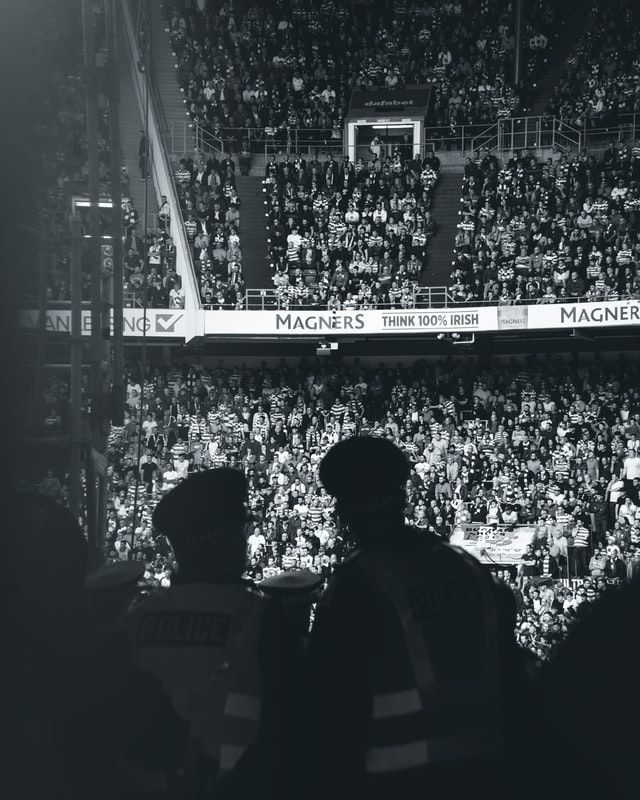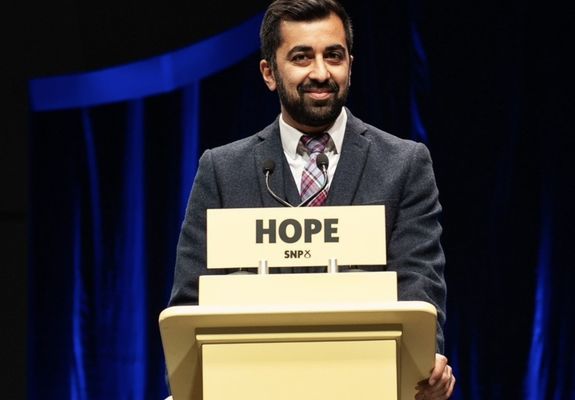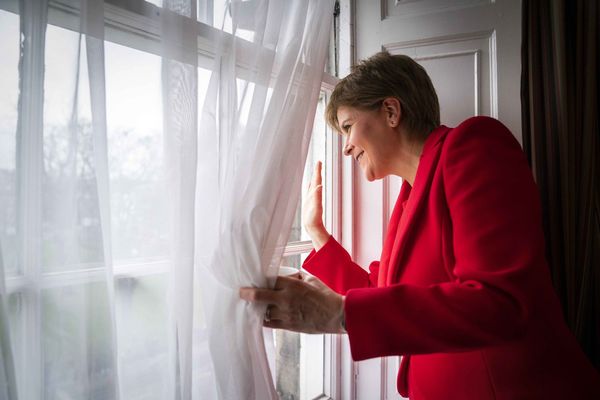It was two days before Christmas and the mood in the away stand at Easter Road, home of Edinburgh’s Hibernian, was anything but festive.
Visiting Aberdeen supporters were watching their team, as the old joke goes, grind out another 0-1 loss. They were angry, but not at their players, or their opponents, but at Nicola Sturgeon’s government.
To the tune of “She will be coming around the mountain” some of the fans were singing about where they thought the Scottish first minister could “shove” her booster jabs. It was not her upper arm.
Fans last night chanting about refusing boosters ahead of Scotland's football/event restrictions. Worrying, not least as it suggests a potentially big prob of disaffected young not complying as they think they are being messed about. Scot Gov need to understand this and address.. https://t.co/YEqfwenl8I
— Chris Musson (@ChrisMusson) December 23, 2021
Those leading the chorus looked young. Some public health advocates blanched: this ditty, after all, was way, way off message during a pandemic.
I’m not sure it is sensible to take what football supporters say on the stands too literally. Fans, to take one famous example, do not actually think referees are blind, even if they keep insisting that they are.
Two arrests as boisterous Rangers fans disrupt Belfast-Lyon flight.https://t.co/DXlBM4qcRY
— Andersonstown News (@ATownNews) December 9, 2021
And vaccines are popular in Scotland: the country has one of the world’s highest uptakes of the third dose. So those Aberdeen fans - and others - were not really cross about an extra jab; they were mad the Scottish Government, spooked by the prospect of a winter "tsunami" of Omicron cases, had restricted crowd numbers to 500.
BANNING BIG CROWDS
Banning big crowds - as any health expert will tell you - is a pretty basic way of stopping the spread of a bug. Scottish restrictions as Omicron emerged were fairly typical of much of the rest of Europe, including Northern Ireland.
⚽️ “Football issues were perceived by campaign strategists to possess a degree of potential political influence on the general public”. @StuartWhigham @JohnKellyEdin & Alan Bairner on political attitudes, football & the Scottish electorate 🔽https://t.co/9UAfTbzpun
— The UK in a Changing Europe (@UKandEU) January 5, 2022
But not England. And that was an opportunity for a unionist grievance: why, tweeted one Scottish contributor for rightist broadcaster GB News, could he get in to a game in London but his mates back home could not?
Anger at crowd restrictions cut right across Scotland’s sometimes painfully divided football culture. On Boxing Day, some Celtic fans travelled to Perth where their heroes were playing relegation contenders St Johnstone. Unable to get in, they set off flares and unfurled a banner about the SNP that coy newspapers blurred and referred to as “offensive”.
They found common cause with their Glasgow rivals, Rangers.
This week (Jan 12) Ms Sturgeon announced in parliament that restrictions on outdoor crowds were being lifted as the threat of omicron faded. Outside Holyrood a Rangers fan group called Union Bears had staged a protest. A group spokesman used language that - in my view - echoed the hyperbole of the anti-lockdown, anti-vax movement. Sturgeon, he said, was “authoritarian”; football fans were “scapegoats”.
📸 Rangers ultras Union Bears demonstrate at parliament with message for Nicola Sturgeon and SNP governmenthttps://t.co/7OvmmBPu4W pic.twitter.com/iuYszHEgJg
— Scottish Sun Sport (@scotsunsport) January 11, 2022
It is tempting to dismiss the rage as a sort of empty but visceral scream. But the ire was clearly heavily politicised. And opponents of the SNP - and its independence project - have been quick to see an opportunity.
That is because football, in Scotland, matters. Attendances, per capita, are higher than anywhere else in Europe. Three times higher than in England, four than Germany, according to the Association of European Professional Football Leagues. The sport is not just widely popular, it is deeply so too. There are people whose cultural and political identities are profoundly tied to their club. How many? Well, that is hard to say.
The Taliban supports Celtic.
— Tim in Tonga (@Nipi28) April 15, 2021
One of the most bizarre, and funny things I’ve read about the Celtic support in ages.https://t.co/gxw3okc6P1
There are political stereotypes about the supporters of Scottish clubs, especially Rangers and Celtic, that far from always stand up to much scrutiny.
CELTS FOR INDEPENDENCE?
Take Celtic. Scholars have talked about the importance of Scots of Irish Catholic background to the independence movement. Back ahead of the 2014 referendum, Scotland’s best-known historian, Sir Tom Devine, all of whose grandparents are Irish, referred to a “quiet revolution” in this community. Back in the 1970s some Scots with Irish roots were wary of devolution and of independence, of living in a Presbyterian state, polls suggest.
When the Celtic fans start having a go at @NicolaSturgeon it's time for the SNP to worry. pic.twitter.com/VxhS4OQudX
— David Atherton (@DaveAtherton20) December 29, 2021
Devine said the “death of structural sectarianism” meant such voters were "now much more confident in their Scottish skins”.
This analysis is often, by extension, applied to Celtic supporters, many (but far, far from all) of whom feel an affinity with Ireland or Catholicism.
Many Celtic fans, the theory goes, have switched from Labour to SNP, and started feeling as strongly about Scotland’s independence as Ireland’s.
Celtic is a big club. Its fan base is huge and diverse. The same is true of Rangers. The Ibrox club is often seen as a bastion of Scottish and Northern Irish unionism, even electorally.
Some of its fans wave UK flags and, if you ever wade in to social media, there are no shortage of accounts who worship the blue side of politics as well as football.
But there is a but.
GLASGOW MINDSET
Polls actually show that Rangers supporters and Celtic supporters, by a small margin, both support independence. In fact, the views of fans mirror that of the city of Glasgow, where both clubs are based.
There is also the politics of Scotland’s national team, which is just coming out of two decades in the doldrums having played in its first international finals since 1998.
Celtic fans with a message for the SNP tonight. pic.twitter.com/eEKrr7Zuxv
— Fitba Culture 🏴 (@fitbaculture) December 22, 2021
Scotland used to do relatively well. There was always talk of this contributing to nationalist sentiment. However, many fans were dismissed as “90-minute patriots”, in the famous put-down of maverick nationalist Jim Sillars.
Every Scot must know a Tartan Army diehard who supports whoever England plays at football but still opposes independence.
Football loyalties do not necessarily translate in to political ones. But - and here is the rub - they sometimes do.
Earlier this month a group of sports academics published a short paper on the topic for the A Changing UK in a Changing EU project.
Traditional political stereotypes about fans, they said, “persist to a degree”.
They concluded: “Although football-based allegiance is but one such minor factor within this complex political debate, the potential opportunity to tap into this populist domain by politicians is unlikely to go unnoticed in future campaigns.”
REBEL HEARTS
That means the politics of Scottish football are worth watching. Again. A decade ago the SNP introduced a counter-sectarianism law, the Offensive Behaviour at Football and Threatening Behaviour Act. The legislation initially won the backing of most fans, if polls are to be believed. But it was later repealed after complaints it was being left to police to decide whether, for example, an Irish rebel song was OK to sing or not.
The SNP has made the impossible possible by uniting rival football fans across Scotland - from Rangers to Celtic, from Hearts to Hibs - who are flabbergasted by the 500 spectator limit at games.
— Dr Sandesh Gulhane MSP (@Sandeshgulhane) December 29, 2021
Football is so important to the mental health and cohesion of our communities. pic.twitter.com/O94WwxZXJY
The latest row may not last. Why? Because Scotland, like Northern Ireland and Wales, has come out of the Omicron surge with meaningfully lower infections than England.
The Scottish league is resuming after its winter break - but with enhanced vaccine passport controls. Those Aberdeen fans might want to rethink their attitudes to boosters. Because they may well need to show proof they have had the third jab to see their team.








